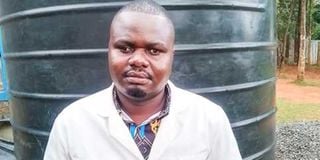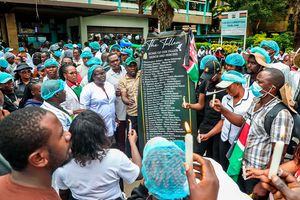
Immaculate Njoki (left), Emmanuel Kiluyi and Mirriam Wachera.
In 2020, the shadow of COVID-19 descended upon the world with merciless force. A sinister virus, invisible yet devastatingly present, tore through communities, leaving grief in its wake.
The dead were sealed in airtight caskets, their final journeys witnessed by ghostly figures in hazmat suits whose expressionless masks completed the clinical choreography of pandemic burials.
The rituals of mourning collapsed under health protocols. Mourners, mere handfuls where crowds once gathered, stood at prescribed distances, their collective grief unable to find release through human touch.
The fundamental language of comfort, embraces, shared tears, the gentle farewell touch, vanished, replaced by an aching void where even in unity, each person grieved in isolation.
Yet amid this collective retreat into private spaces, 8,571 nurses newly recruited under the Universal Health Coverage program moved in the opposite direction. While the country shuttered behind closed doors, these healthcare workers stepped deliberately toward danger.
Their professional milestone, securing coveted government positions, was overshadowed by the knowledge they were walking into facilities transformed into battlegrounds against an invisible enemy. Among these brave souls was Mirriam Wachera.

Miriam Wachera speaks on her experiences as a nurse at Nation Center on May 17, 2025.
She lands job at Muranga Hospital. For days, she witnessed desperate gasps of patients, the hushed, urgent voices of doctors whose faces were lined with exhaustion, and the constant, beeping symphony of machines.
She became the human connection for isolated patients, her gloved hands offering comfort to those whose loved ones could only reach them through phone screens. She cooled fevered brows, administered treatments, and maintained the endless sanitisation rituals that offered some protection.
When the government failed to provide adequate protective equipment, Ms Wachera and her colleagues faced exposure with raw courage, and mourned together in their WhatsApp group as posts announcing fallen colleagues appeared with heartbreaking regularity.
Joining the UHC program in 2020 felt like divine intervention. "It felt like the government itself had reached down to lift us," she recalls with lingering wonder. But her elation quickly faded as reality set in, deployment to high-risk isolation wards without proper protection, the loss of colleagues to the virus, and then a personal tragedy when her supporting sibling died, shifting family responsibilities entirely onto her shoulders.
Wachera's three-year contract (May 2020-2023) ended without clear direction from the authorities. Though eventually extended for a year with promises of permanent positions, the situation remained precarious.
"We carry identical workloads as permanent staff who look down on us," Wachera explains. "They expect longer hours from us, with only 30 days of leave and no additional benefits."
The stress triggered severe depression and anxiety, confirmed by clinical assessment. "I couldn't care for my two children despite working tirelessly," she recalls. "I considered overdosing on medication to escape the pain, stopping only for my children's sake."
The toll has been devastating—five nurses from her group of 45 have died by suicide. Though now on another one-year extension, permanent absorption remains elusive, yet they cannot seek other government positions as they appear "employed" in the system.
"The government has no concrete plan," Wachera laments. "Last year, they promised absorption funds, then in December mentioned gratuity payments before deciding our fate—nothing materialised. We've been protesting since February 2025. Our patients suffer, but so do we."
The bureaucratic tangle worsens as national and county governments deflect responsibility to each other. "All we want is permanent employment with pension benefits or our promised gratuity," she says.

Immaculate Njoki speaks at Nation Centre on her experiences as a nurse on May 17, 2025.
Ms Immaculate Njoki explains their financial struggle: initially hired at Sh50,000 monthly—unchanged five years later, their take-home pay has plummeted to around Sh11,000 after increasing deductions, including housing levies and higher NSSF and SHA contributions that sometimes aren't even properly remitted.
Unlike their counterparts in national hospitals who secured permanent positions, county-based UHC nurses remain in employment agony with no salary increases or improved terms.
Despite multiple protests, the UHC nurses' crisis remains unresolved after passing through three different health cabinet secretaries, each promising change without delivering results.
"When the current Cabinet Secretary, Aden Duale, took office, he promised to resolve their issue within three weeks. However, instead of a resolution, he issued a circular seconding them to the counties with only stipends. There has been no further communication regarding permanent and pensionable employment terms or when their gratuity will be cleared," says Njoki.
This bureaucratic limbo persists as county governors disown responsibility, claiming these healthcare workers belong to the national government and citing insufficient funds for absorption, creating a perfect storm of institutional abandonment.
"We have suffered, we cannot pay rent, school fees, or feed ourselves. I have to take sleeping pills to sleep. I wake up during the wee hours of the night and cry to God, asking Him why He has forsaken us. I have repeatedly questioned my decision to be a healthcare worker. We fought for the nation during a pandemic, but we have no one to fight for us. We've been discriminated against in our workplace due to our meagre pay, yet we do the same work with healthcare workers under permanent and pensionable terms who receive twice or thrice our salaries," says Njoki.
Her desperation echoes in her pointed questions: "Anyone who tries to fight for us either in the senate or parliament is not given audience; could our issue be a political issue we're not aware of? Are we children of a lesser God? Are we orphans in our own country? Why are we not being factored out in the current budget if there is any goodwill for us and our healthcare system? How do we go back to work with unstable minds and unpaid bills? How do we take care of our sick patients and families when we are not okay?" asks Njoki.
Emmanuel Kiluyi highlights the harsh realities in rural facilities where most UHC nurses serve. Without basic supplies, they're forced to risk their health daily.

Emmanuel Kiluyi, a UHC nurse employed at Bungoma County.
"Sometimes you need to deliver a child. There is bleeding, you handle blood, patient faeces, and other body fluids, but the facility doesn't have gloves. This forces you to buy supplies out of pocket. We are also not given risk allowance, which exposes us to risks," says Kiluyi.
Many colleagues have contracted serious illnesses, including viral and bacterial pneumonia. They face harassment for not wearing proper uniforms, costing approximately Sh20,000, with no uniform allowance provided. Severe understaffing forces them to work extended hours, often alone, to maintain 24-hour coverage in remote facilities.
This combination of hazardous conditions, financial strain, and institutional neglect has created a healthcare workforce in crisis, the very professionals who saved Kenya during its darkest hours are now abandoned to struggle alone.
The healthcare crisis extends beyond UHC nurses to medical interns facing similar struggles. Despite government promises to investigate suicide cases and improve conditions, interns report that nothing has changed; they remain underpaid, overworked, and depressed.
Harry Collins, who graduated from the University of Nairobi in December 2023, describes his internship as "unpredictable, difficult, tough and one that needs a lot of resilience."
"There's a huge shortage of workers in those facilities and you have to fill that deficit. There are strict supervisors and uncaring colleagues. Medical interns in this country are paid their first salary after five months, yet most of the time, you are posted to a region they are not even familiar with," says Harry.
“I don't even want to imagine what doctor interns from poor families had to go through. Decades ago, interns used to have accommodation within government hospitals; right now, those houses are occupied by other people. How do you pay rent when you are not getting paid and are working 36-hour shifts, which doesn’t allow you to do any side hustle?” he asks.
Dr Enoch Makori, a Medical Officer Intern in Kisumu, regularly works 70-100 hours weekly despite a 48-hour official schedule. On call, he works 36 hours straight with barely time to eat or rest.
"You're treating patients, resuscitating babies. But you're broke, borrowing fare to get to work. I'm not complaining about the work. I knew medicine would be tough. But here, it's different. You work like a soldier in a war zone, but without the armour," he says.
“What keeps me going? That one patient who smiles and says, ‘Thank you, daktari.’ That one life I helped save. The hope that if we stay, if we speak up, this system can get better. That’s why I’m still here,” he says.
He perseveres for the grateful patients and lives saved, hoping for system improvement. "To the people in charge, please listen to us. We are not machines. We are not invisible. We are doctors, yes, but we are human first."
Dr Davji Atellah, KMPDU Secretary General, identifies the core issue: counties have drastically reduced doctor employment over 6-7 years while healthcare demands increase. He advocates for hiring 2,000 doctors as agreed in the 2025-2026 budget.
"If you compare their working conditions with our compatriots in Botswana or South Africa, you realise they are earning double what the intern doctors are earning in Kenya. Universal health care that we all want must focus on human resources," he said.







